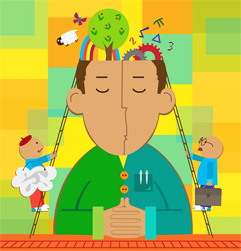
Pitfalls of Perception
The Three Weeks are a time to reflect as to where our intellects have taken us. Arrogance is when a person expects the world to function according to his logic; as such, even people of the highest intelligence are liable to make grave mistakes.

The downfall of many great intellectuals was that they thought they were capable of understanding the Creator, and that their minds were capable of comprehending Divine reason. Consequently, as soon as Divine workings seemed illogical according to their perception, they became heretics.
This is exactly what happened to Elisha Ben Abuya[1]: Chutzpit the Translator was one of the ten holy martyrs killed by the Romans. Elisha ben Abuya saw his body discarded in a trash bin, in the worst imaginable disgrace. He said to himself, is this the reward that one of the generation’s greatest righteous men gets for serving Hashem? He saw a father and son climbing a tree in performing the Torah’s mitzva of shiluach haken, sending the mother bird away before taking the eggs or chicks from the nest. The son fell off the tree and was killed instantly. He asked himself, is this the reward for a mitzva that promises longevity? The discrepancy between his own powers of reason and Divine will and logic undermined his emuna, and he became a total heretic. The same happened with Korach, Absalom and Ahab. They all placed intellect before emuna. As soon as they failed to comprehend things, they not only lost their emuna  but their minds as well, all suffering tragic downfalls.
but their minds as well, all suffering tragic downfalls.
If a person places intellect – even the intellect of Torah – before emuna, he will undoubtedly make grave errors. Such were the spies, who slandered the Land of Israel and caused tragedy to befall the entire Children of Israel. They used their own “Torah logic” to reason that it’s better to remain in the desert, eat manna and learn Torah, than it is to enter the Land of Israel and settle the land.
Why did the spies rely on their own powers of reasoning? Why didn’t they ask Moses what Hashem wanted? Didn’t they see that everything Moses did, from taking the Children of Israel out of Egypt to existing in the Sinai desert was the sole result of emuna? Korach too complained, why doesn’t Moses treat everyone in a democratic manner? All the people are holy, so why are there different levels and a hierarchy of Cohen, Levy and Yisrael?
The above questions and all those like them are the product of arrogance, when a person expects the world to function according to his logic. That’s why people can make grave mistakes if they interpret the Torah according to their logic rather than accepting Hashem’s will with emuna. As such, Tzlaphchad chopped wood on Shabbat to show the severity of violating Shabbat. Who asked him to do such a thing? This was the second Shabbat after Israel left Egypt; were Israel to observe two Sabbaths in a row, they would have been redeemed on the spot! Tzlaphchad, with his logic, ruined the Geula, the full redemption of our people, bringing downfall not only to himself, but to our entire nation. This is the tragic outcome of placing logic and intellect before emuna.
We should consequently be extra careful – if prodigious intellectuals and even tzaddikim made such grace mistakes, we certainly are liable to. One whose intellect is disconnected from emuna cannot expect a happy outcome.
We can now understand what King Solomon intended when he said, “Don’t be overly righteous or excessively wise…Be not overly wicked nor be a fool.” Don’t be so wise as to think you can understand Hashem; such an attitude will bring a person to spiritual tragedy. Even worse, one could be liable of being “overly wicked,” like Acher, who became totally disoriented when he found a discrepancy between Divine logic and his own. The golden path is therefore the path of prayer and emuna.
Those who think they can attain Divine logic with their own brainpower pursue the path of arrogance, where a person thinks he is capable of understanding everything and that the world must function according to his logic. Such an attitude has several manifestations: there are those who choose to live a life of wantonness, desiring to do whatever they want whenever they want, acting like beasts with no conscience whatsoever. Therefore, they discard morality and truth in order to accommodate their own bodily lust. This is what happens to most people, whose outlook on life is simply governed by their own personal lusts and appetites. Their bodily desires shape their opinions.
There are those on a higher intellectual level whose lust for knowledge is their greatest lust. Even though their lust for intellectual distinction is stronger than their animalistic urges, such intellectual lust actually leads to animalistic lust as well. This is the temptation of the snake, the evil inclination: it fools a person to follow his own mind rather than the Torah, and eventually it reduces even the intellectual to base levels of lust and debauchery.
The Gemara explains the above phenomenon (see tractate Sanhedrin, 63b): the entire objective of the Golden Calf was to enable the people to be openly licentious. The people surely knew that idolatry was wrong, but they had to refute the Torah since the Torah did not allow them to pursue their bodily lusts. So we see that lust overcomes both logic and truth.
The prophet says, “They will not abandon their deeds to return to their G-d, for the spirit of harlotries is in their midst, and Hashem they do not know” (Hosea 5:4). People refuse to abandon their evil ways because of their promiscuity. So we see that heretical tendencies are actually rooted in bodily lust and appetites. People look for reasons to say the Torah is false, because the Torah doesn’t allow them to do what they want to do. They fail to understand that their entire mission on earth is to refine character, withstand temptation and uproot base desires. The bitter end of Elisha Ben Abuya is thereby displayed in the Gemara by his taking a wanton woman from the marketplace.
Every person, even those who observe the Torah, harbors heretical tendencies that are proportionate to his desire for lust. If a person strives for truth, he realizes the dishonesty of his bodily appetites and is less liable to fool himself. The Ramchal explains that the acknowledgment of truth strengthens the soul and distances a person from the evil inclination. Nothing weakens the soul like the failure to acknowledge the truth.
The Three Weeks are a time to reflect as to where our intellects have taken us. Both Temples have been destroyed; if we do not merit in rebuilding them, then it’s a sign that we haven’t rectified the core reasons that led to their destruction.
With the Ramchal in mind, two things strengthen the soul – putting emuna before intellect and acknowledging the truth. One who does both will undoubtedly rectify, and make a major contribution to rebuilding our Holy Temple, speedily and in our days, amen!











Tell us what you think!
Thank you for your comment!
It will be published after approval by the Editor.